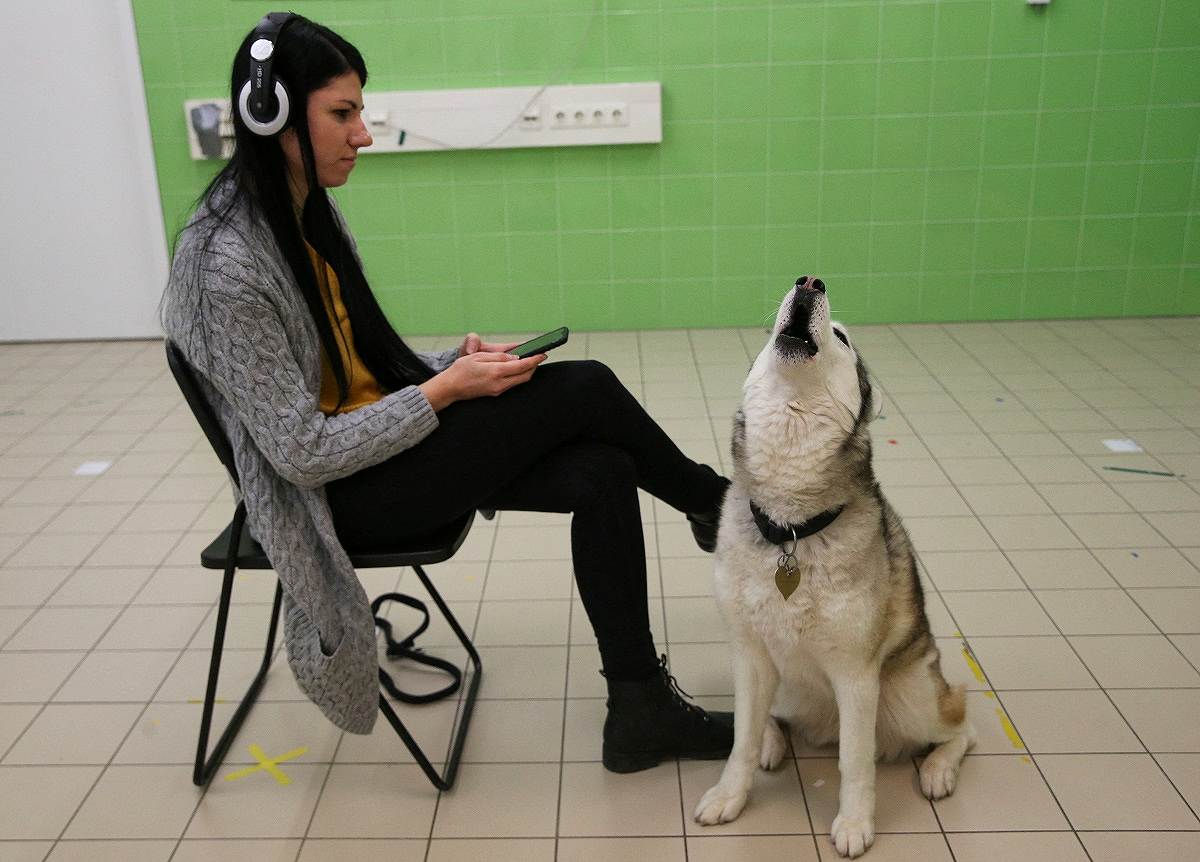
Bizsu howls next to her owner, Fanni Lehoczki, during a test trying to find why specific dog breeds are more prone to howl, at the Ethology Department of the Eotvos Lorand University in Budapest on Feb. 7.
17:37 JST, March 8, 2023
BUDAPEST (Reuters) — When Hungarian animal behaviorist Fanni Lehoczki noticed the frequent howls of her Siberian husky “Bizsu” didn’t always provoke other dogs into a wolf-like response, it prompted the question — why are certain dogs more prone to howling?
Researchers at Budapest’s Eotvos Lorand University where Lehoczki works examined whether certain dog breeds are more prone to howling and if this had anything to do with their genetic closeness to wolves.
Lehoczki and her team examined how a dog’s breed, age and sex impacted its reaction to howling, by testing 68 purebred family dogs by playing three-minute recordings of wolf howls and observing their reactions.
The dogs in the experiment belonged to 28 different breeds ranging from ancient breeds such Shiba Inu, Siberian husky, Alaskan malamute, and Pekingese, to bull terriers and boxers.
“The main finding was that … those breeds which are genetically closer to wolves are more prone to respond with howling, and they also show more stress signals than dogs which are less related to wolves,” Lehoczki said, noting this was true only for dogs older than five years.
Among younger dogs there was no difference between the breeds, so researchers will examine this aspect further.
Older dogs of more ancient breeds responded with longer howls and showed more stress-related behaviors too, while more modern breeds seemed to react with barking.
The research also concluded that breeds that tend to howl more also show more stress-related behavior such as yawning, shaking their body, licking their mouth or scratching.
The study is the first specifically investigating howling in domestic dogs. “Domestication and selective breeding by humans fundamentally changed dogs’ vocal repertoire and both the perception and production of howling in dogs,” it concluded.
Top Articles in Science & Nature
-

Japan Institute to Use Domestic Commercial Optical Lattice Clock to Set Japan Standard Time
-

Japan to Face Shortfall of 3.39 Million Workers in AI, Robotics in 2040; Clerical Workers Seen to Be in Surplus
-

Record 700 Startups to Gather at SusHi Tech Tokyo in April; Event Will Center on Themes Like Artificial Intelligence and Robotics
-

iPS Treatments Pass Key Milestone, but Broader Applications Far from Guaranteed
-

iPS Cell Products for Parkinson’s, Heart Disease OK’d for Commercialization by Japan Health Ministry Panel
JN ACCESS RANKING
-

Japan PM Takaichi’s Cabinet Resigns en Masse
-

Japan Institute to Use Domestic Commercial Optical Lattice Clock to Set Japan Standard Time
-

Israeli Ambassador to Japan Speaks about Japan’s Role in the Reconstruction of Gaza
-

Man Infected with Measles Reportedly Dined at Restaurant in Tokyo Station
-

Videos Plagiarized, Reposted with False Subtitles Claiming ‘Ryukyu Belongs to China’; Anti-China False Information Also Posted in Japan






















